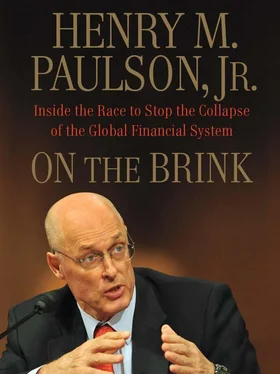I’d had a hard time attracting Treasury people who had experience with Wall Street deal making. Now, with no time to lose, I reached out to two all-stars, Ken Wilson and Dan Jester. Neither was looking to come to Washington, but I had worked closely with both at Goldman Sachs. I trusted their expertise and judgment, and believed I could persuade them to join me.
When I called Ken in July, I knew the move would require a sacrifice on his part. I decided to reduce the likelihood of a turndown by having President Bush call his old friend and Harvard Business School classmate personally. It worked: Ken began working full-time at Treasury on August 4.
Dan had been a banker in the financial institutions group, then Goldman’s deputy CFO and a key member of the risk committee, before retiring in the spring of 2005. The following year I had asked him to join Treasury as an assistant secretary, but he hadn’t wanted to uproot his family from their new home in Austin, Texas. This time I impressed on him the nature of our emergency, and he signed on immediately, even though it meant leaving his family behind for six months. Unflappable and brilliant, with strong analytical and financial engineering skills, he quickly won the confidence of the Treasury team as he dug into the GSEs’ finances.
Ken, who had been a chairman of the financial institutions group at Goldman, also worked on the GSEs, and, equally important, I asked him to be the point of contact for Dick Fuld. With Lehman desperate for a solution, there could have been no better confidant than Ken, who probably knew more people and had better relationships in financial services than anybody in the business.
Dick regularly discussed his problems with Ken, as well as the conversations he was having with investors about possible transactions. At the time, Lehman was talking with, among others, the state-owned Korea Development Bank (KDB) and China’s Citic Securities. (Later I would learn that Lehman’s CEO had approached a stunning range of possible partners, from Deutsche Bank and Morgan Stanley to British giant HSBC, Middle Eastern sovereign wealth funds, and AIG, which soon would find itself in desperate straits.)
Unfortunately, word of Dick’s search for possible investors popped up in the press, lending Lehman an air of desperation and eroding confidence in the firm. Ken did his best to impart a need for pragmatism. But it was clear to Ken and me that Dick was looking for an unrealistic price.
HERA failed to boost the market’s faith in Fannie and Freddie. Their abysmal second-quarter earnings announcements made matters worse. On August 6, Freddie reported that it had lost $821 million in the period; two days later, Fannie followed with a $2.3 billion loss, forecasting “significant” credit-related expenses in 2009.
We worked to shore up confidence. In mid-July I had told Dave McCormick to reach out to international investors, approaching finance ministers and central bankers. “Make sure they understand what we’re doing,” I instructed him. “Make sure that to the extent we can say it that the U.S. government is standing behind Fannie Mae and Freddie Mac.”
From the moment the GSEs’ problems hit the news, Treasury had been getting nervous calls from officials of foreign countries that were invested heavily with Fannie and Freddie. These calls ratcheted up after the legislation. Foreign investors held more than $1 trillion of the debt issued or guaranteed by the GSEs, with big shares held in Japan, China, and Russia. To them, if we let Fannie or Freddie fail and their investments got wiped out, that would be no different from expropriation. They had bought these securities in the belief that the GSEs were backed by the U.S. government. They wanted to know if the U.S. would stand behind this implicit guarantee—and what this would imply for other U.S. obligations, such as Treasury bonds.
I flew to China for the Olympics on August 7. Officially it was a family trip, and Wendy and I were accompanied by our children and their families. Even though it was a vacation, I had a number of meetings scheduled with Chinese officials, and I worried about Fannie and Freddie the whole time I was in Beijing.
Wendy had planned our free time down to the minute. In the mornings we got up early and explored Beijing’s stunning parks and historical sites, including the Summer Palace and the Forbidden City. (One day we practiced tai chi with a grand master.) Security at the Great Wall was high because an American couple had been stabbed at a Beijing tourist attraction just after the games started. At one point, exploring a guard tower with a low ceiling, I hit my head. Now, I’ve got a hard head, but I don’t suffer in silence, and I screamed in pain. Chinese officials were beside themselves when they saw the U.S. Treasury secretary gushing blood. But afterward, a number of China’s leaders made a point of apologizing to me, tongue in cheek, for not having built higher-ceilinged guard towers.
Between the sightseeing and the Olympic Games, my family had a great time. At 14 months, with blond hair and blue eyes, my granddaughter, Willa, was very cute, and many Chinese wanted to hold her and take her picture. At the Olympic events, they invariably handed her a little Chinese flag, which made me a bit uncomfortable. The last thing I needed in the newspapers back home was a picture of my granddaughter on my lap waving a Chinese flag. So whenever she was handed one, I would pass Willa off to another family member or take the flag away—carefully, because I didn’t want her to start crying.
I was delighted to see swimmer Michael Phelps in action and to witness U.S. gymnast Nastia Liukin winning the individual all-around gold. But those who knew me well could sense my anxiety. NBC broadcaster Tom Brokaw spotted it when he interviewed me outside the Olympic stadium on a range of issues, from U.S.-China relations to Fannie and Freddie. I ended up leaving my cell phone, suit, and shirt on the NBC set; we had to go back and collect them. Tom, a longtime friend, told me afterward that he could tell I was deeply preoccupied, my mind far away, because of the heavy burden I was carrying.
It didn’t help that my calls home needed to be cryptic. Communications in China weren’t secure, and I didn’t want any news to leak out about how bad things were going with the GSEs. On the contrary, I was doing my best, in private meetings and dinners, to assure the Chinese that everything would be all right.
What I learned in Beijing, however, left me less than reassured myself: Russian officials had made a top-level approach to the Chinese suggesting that together they might sell big chunks of their GSE holdings to force the U.S. to use its emergency authorities to prop up these companies. The Chinese had declined to go along with the disruptive scheme, but the report was deeply troubling—heavy selling could create a sudden loss of confidence in the GSEs and shake the capital markets. I waited till I was back home and in a secure environment to inform the president.
When I returned to Washington on Friday, August 15, I was preoccupied with the GSEs and Lehman Brothers. The GSEs were such a huge, obvious problem that I knew we would somehow take care of them, but Lehman presented another level of potential trouble. Without wind-down powers, we could be forced to stand by as the firm failed and the entire financial system felt the shock.
One of my first calls was with Dick Fuld, who was entertaining any number of ideas to raise capital, including a plan to package problem commercial real estate into a separate company and spin it off to shareholders. Lehman needed to raise capital for this so-called Spinco, but was having trouble attracting any from the private sector. Dick asked Tim Geithner and me if the government would invest in Spinco. We each said no—several times. The government had no authority to do so.
Читать дальше












